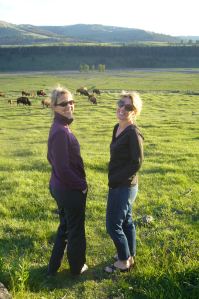Kirsten and I started Torrey House Press in 2010 as we started to gain appreciation and concern for a lack of public awareness of public land management and environmental issues, particularly here on all our public land in the West. We saw first hand how many of the land management agencies who are entrusted with the care of our western public lands are “captured” by the special interests they are supposed to regulate and end up serving only these interest’s needs at the expense of the rest of us. We realized that as long as there was general public apathy about any given issue there would never be the political will to improve things and without political will land managers were free to bend and break rules. In the West, such rule breaking remains the norm. We believe that the power of pen and story might shed needed light on such practices and help develop a land ethic that results in more grass on the mountains and water in the streams.
One of those mismanaged issues are wolves. This month’s issue of Outside Magazine has a piece on wolves in the West by Elliott Woods titled Wolflandia that puts the power of pen to work, but with a slant that illustrates what I mean by false balance. It is all too common for the press to present opposing viewpoints as if they are equally valid. When it comes to climate change, for instance, the BBC finally grew fed up with the practice. Because 95 to 97 percent of climate scientists agree that man-made greenhouse gas emissions are causing the planet to warm it doesn’t make sense to give equal time to the tiny minority of scientists, if that is what they are, who deny it. To actually balance the truth, the BBC is now taking an approach that severely limits the amount of air time climate deniers are given. Nice, go BBC. And while Elliott Woods does a good job of printing the facts about the wolf issue, the amount a ink he gave to wolf opponents, and his final sentences, present an unfortunate false balance.
I am going to try and get in touch with Woods and ask him if the balance is something he did as an effort at appearing fair minded or if it just made for an effective way to snag readers. Or maybe it is political pressure, of which there is plenty, for him or the magazine editors to worry about. Woods points out that the National Agricultural Statistics Survey blames wolves for only 0.2 percent of annual cattle losses and, a statistic that IS meaningful Elliott, only 4 percent of that total are confirmed. The number of ranchers who graze on public lands is minuscule, and yet their cows are on nearly all of our lands. The number of us who love these public lands for the beauty and want them protected is immense. On one side of the teeter-totter is a million pounds of wolf love, on the other side an ounce of hamburger. There is no balance when it comes to the public environmental welfare on this one. Why make it look as if there is?
So it is a shame that ranchers and outfitters got so much space about their perceived woes with wolves, woes that Woods points out are not supported by the facts but woes he give plenty of air time to none-the-less. And what is particularly sad, grievous really, is Woods ending quote that even though Native Americans and bison (he called them buffalo), were virtually wiped out by us, “there is no going back.” Holy smokes! Of course we CAN make reparations and of course we should. Let’s get on it.
It is a good case for the mission of Torrey House Press. We will keep publishing high quality work that promotes “Love of the Land.” In fact, regarding the wolf issue, we are very enthused to have an upcoming title with author Susan Imhoff Bird called, Howl: of Woman and Wolf.










Mark, your argument against this kind of “balance” is a good one and the comparison with reporting on the science of climate change telling.
Speaking of wolves, there is a remarkable encounter with a pack of wolves in Braden Hepner’s fine novel Pale Harvest, which I just finished reading, an incident that is threatening and ultimately surprising.
By the way, I have just written a short response to the novel, which you can find here:
Thanks, Scott. I commend your taste in titles and scenes. Hepner’s wolf scene put me over the top in the acquisitions department.
Mark, superb article. I have been preaching this for 40 years to hundreds of students ad others. I am a strong advocate of paying “true costs.” In the case of grazing on public lands, for example, true costs must include water management, erosion of topsoil, “pest control,” public wildlife control (read that coyote and wolf killers paid by our taxes), air pollution, land degradation (there is not a stream in western North America that is not substantively modified by overgrazing), and a host of other costs. In some states in the west, for example, ranchers don’t want elk competing with their livestock and so they will kill elk. One common method is to “gut shoot” an elk with a 22 caliber rifle so that the elk will wander away before dying.
Public grazing fees are ridiculously low, not coming close to paying true costs. So all of us subsidize these costs for “gentleman ranchers” and “corporate ranchers.” It is a terrible trade-off. Wildlife loss and land degradation for the good of a very few. Public land grazing by private interests should be managed in very different ways — for the good of the many and not for the good of the few.
Sam, we are of one mind on this one. Now to just get a little public awareness . . .
Hey Mark,
I sympathize with your concerns about “false balance” in the media. I spent a year and a half living in Gaza City and working as a journalist covering the Israel-Palestine conflict, a clear case of a conflict often presented as equally two-sided in which only one side (Israel, with the support of the U.S.) has any power to change the status quo.
Your reading of my wolf story is interesting to me, and I appreciate the criticism. My two chief concerns in creating the wolf story were A) to spend time with the people who represent the most contentious sides of the issue and get to know them as human beings, something environmental reporters rarely do, and B) to try to understand the objective reality of wolf recovery in the Northern Rockies and the world as clearly as possible, something that’s difficult to do when so many of the “facts” are clouded by emotion.
That statistic from NASS you’re referring to—I mention that only a sliver of that .2% is confirmed, something that organizations like WildEarth Guardians fail to mention, I should say—is an example, to me, of a fascinating point to probe more deeply. Nationally, and even regionally, it’s true that wolves and other large predators present virtually no threat to the livestock industry. But there are small producers in my region who have indeed been severely impacted by predator recovery, and the question of how best to help them manage the changing landscape is one that we need to address with an open mind.
To respond to your speculations, no—there were no political pressures on me or my editors, and no one ever told me that I had to write this article any certain way. This article is mine, the creation of my research, my experiences in wolf country, and my journalistic practice. I tried to be as fair and open-minded as I could, even though—not surprisingly—I have strong opinions about wolves, wildlife management, and wild places. If you met me on the street and struck up a conversation, you’d probably go as far as to call me a wolf lover, and we could rant and rave together about the stranglehold that major livestock producers have on the management of our natural resources.
The idea behind this story is to drop the reader into wolf country and be a guide through very contentious issue that virtually everyone in my region has an opinion about. It is not an opinion piece, but rather a primer on an issue that has afflicted regional and even national politics now for more than thirty years. The last sentence you refer to isn’t supposed to be any kind of final point. It’s just an image of a certain way of thinking in this part of the country that will continue to influence regional attitudes on wildlife management and the role of man with regard to wilderness. It’s a hurdle that we who care about these places must overcome with compassion and understanding as opposed to judgment and condescension. And I didn’t use the word “buffalo,” the person quoted used that word—attention to detail is important when you’re a journalist.
At any rate, feel free to contact me if you’d like to hear more.
Thanks for your insight and your dedication to our precious natural resources,
Elliott D. Woods
Hi Elliott,
Thank you very much for your thoughtful reply. I apologize, I said I was going to try and get in touch with you and did not manage to do so.
I clicked over to your website just now and see your point about being dedicated to getting to know people and their stories that are involved in contentious issues. Kudus for your courageous international work in that regard. It is important work and yours is superb. Perhaps an unintended consequence of focusing on the personal side of a story is the presentation that there are two equally valid viewpoints. Tricky stuff and, while it is not always my inclination, I hear you urge me to be open minded about how we manage change in protecting our gorgeous land. And my apologies about attributing “buffalo” to you. I stand duly admonished about being careful.
And yes, I would love to hear more. Kirsten and I were just up in Bozeman in December. If you are passing through Utah please drop us a line. I hope we can continue the dialogue.
With respect,
Mark